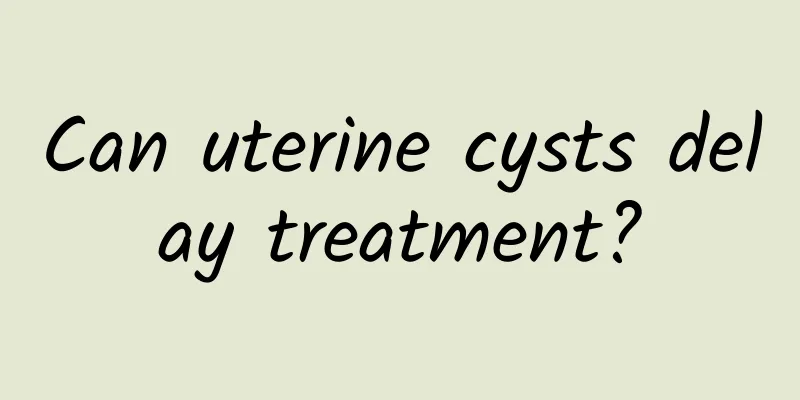What are the common symptoms of uterine fibroids?

|
Uterine fibroids are a benign tumor and a more serious type of uterine disease. So what are the common symptoms of uterine fibroids? Here, experts will introduce the common symptoms of uterine fibroids. 1. Changes in leucorrhea Leucorrhea is closely related to women's health. Normal leucorrhea is a small amount of egg white-like secretion, slightly sticky and without odor. The characteristics of women's leucorrhea will change slightly with the menstrual cycle. Women with uterine fibroids will have more leucorrhea, and occasionally there will be purulent, bloody, or watery leucorrhea, and even rotten meat-like tissue discharge with a foul odor. 2. Abdominal discomfort After a woman is diagnosed with uterine fibroids, the common symptoms of uterine fibroids generally include abdominal discomfort such as lower abdominal distension, back pain, etc. If the uterine fibroids are twisted, ruptured or degenerated, it will cause severe abdominal pain. 3. Abdominal mass If the uterine fibroids grow larger, you will find a mass in your abdomen when you touch your abdomen. The method of examination is to lie flat on the bed in the morning, on an empty stomach or after defecation, bend your knees, relax your abdomen, and press your lower abdomen with both hands, from light to deep with breathing, usually from the opposite lower abdomen upwards. If the abdominal mass is large, you will easily feel the mass. 4. Compression symptoms When the disease develops to a certain extent, common symptoms of uterine fibroids include fibroids growing forward or backward, which can compress the bladder, urethra or rectum, causing frequent urination, dysuria, urinary retention or constipation. When the fibroids grow to both sides, they form broad ligament fibroids, which compress the ureter and cause hydroureteral or renal pelvis; if they compress the pelvic blood vessels and lymphatic vessels, they can cause lower limb edema. Recommended reading: What are the specific manifestations of the harm of uterine fibroids? 5. Secondary anemia For women with uterine fibroids, long-term excessive menstruation may lead to secondary anemia, with symptoms such as general fatigue, pale complexion, shortness of breath, and palpitations. 6. Menstrual changes Once a female friend suffers from uterine fibroids, the common symptoms of uterine fibroids are usually shortened menstrual cycle, prolonged menstrual period, heavy menstrual flow and irregular vaginal bleeding, which are the most common symptoms. Female friends should go to the hospital for examination in time when they experience menstrual changes, find out the cause and actively treat it. The above content is the common symptoms of uterine fibroids introduced by experts. Everyone should pay attention. I hope the above content can be helpful to you. If you have other questions about the common symptoms of uterine fibroids, please consult online experts and they will give you detailed answers. For more information, please visit the uterine fibroids special topic at http://www..com.cn/fuke/zgjl/ or consult an expert for free. The expert will then give a detailed answer based on the patient's specific situation. |
<<: What are the causes of irregular menstruation?
>>: What impact do uterine fibroids have on fertility?
Recommend
How much does it cost to cure uterine effusion?
Uterine effusion is a common disease in women. Me...
How to take the right nutritional supplements to gain muscle and lose fat? Eating "these" can help you accelerate muscle growth and fat loss
Nutritional supplements are an area that many fit...
What to eat to lose weight faster? Get ready for these 15 great weight loss foods!
It’s hot summer again, and everyone is crazy abou...
How do uterine fibroids form?
Uterine fibroids are a gynecological disease with...
Are you a holiday athlete? Is it normal to feel sore all over after exercise?
To live you have to move, but too much or too int...
Are cervical warts life-threatening?
As the incidence of cervical warts gradually incr...
Can I eat fermented rice wine eggs during menstruation? It depends on the specific situation of menstruation
Whether you can eat fermented rice wine eggs duri...
How to check chocolate cyst
Experts say: Chocolate cysts have a tendency to b...
How big is a physiological ovarian cyst?
How big is a physiological ovarian cyst? Physiolo...
It’s too cold in autumn and winter and you don’t want to move? 5 tips from a supermodel coach
We want exercise to become a natural part of our ...
Increased appetite makes it difficult to lose weight, dampness and heat in the spleen and stomach are the cause! Chinese medicine doctor Zhang Wenxin: Press two major ear points to embrace the bird stomach
Office workers are busy with work and have irregu...
Eliminate leg edema with 4 movements to promote blood circulation and prevent coldness
The thighs have large muscles and a lot of blood ...
Uterine fibroids are more common in middle-aged women
Uterine fibroids are a common gynecological disea...
Knowing women’s hearts best: the advantages of painless abortion
Abortion is a remedial measure taken by women due...
The harmful effects of uterine fibroids
Uterine fibroids are common in life, and many peo...









